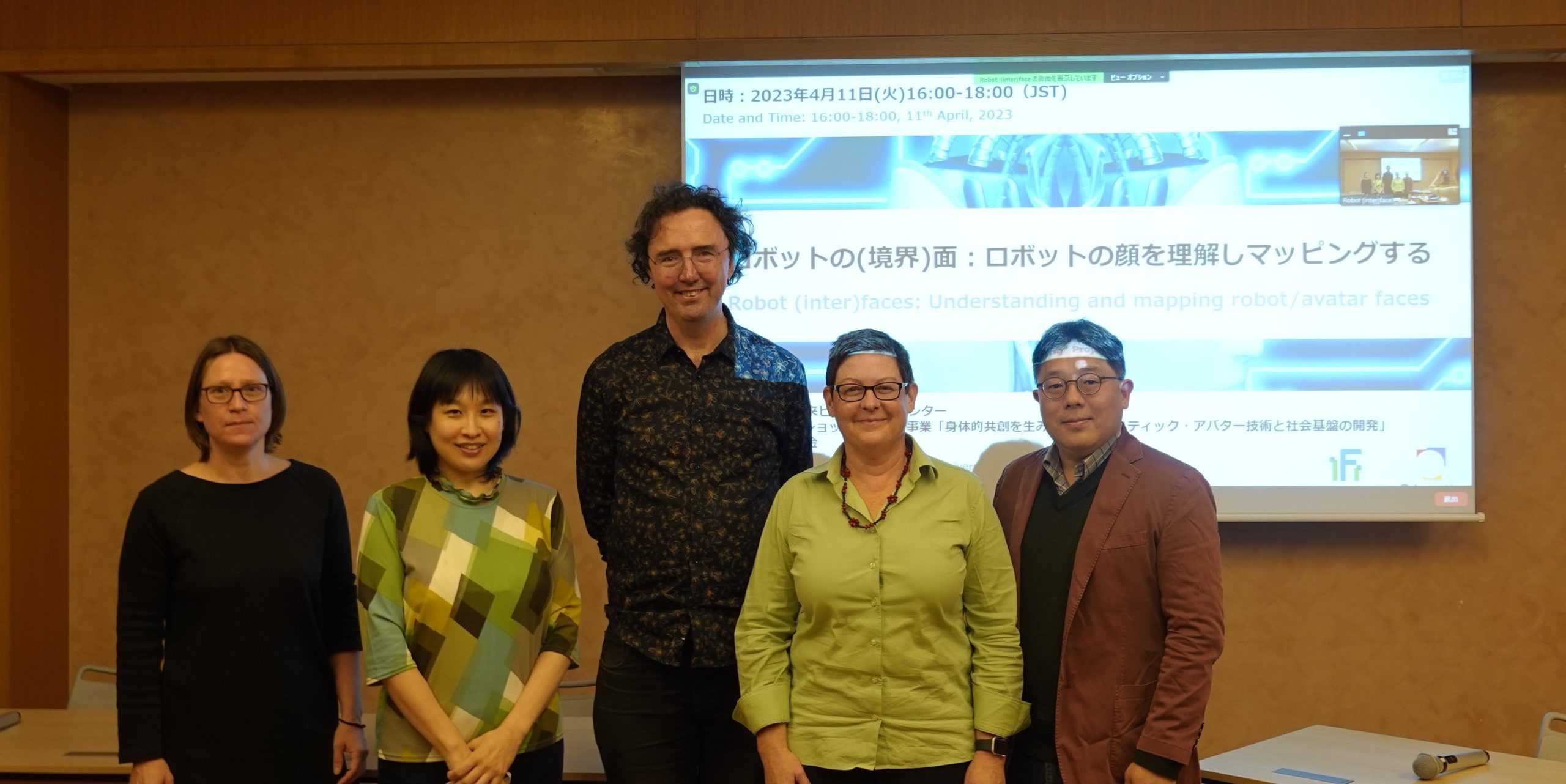Robot (inter)faces: Understanding and mapping robot/avatar faces
- Date:Tue, Apr 11, 2023
- Time:16:00-18:00 (JST)
- Location:【in-person for Presenters and limited invited researchers】 Seminar room, 3rd floor, Ito International Research Center, UTokyo【For the audience】Online (zoom)
- Host:
Institute for Future Initiatives, The University of Tokyo
- Co-host:
JST Moonshot R&D Program “Cybernetic being” Project
- Support:
Australia-Japan Foundation
- Language:
Japanese/English (simultaneous translation)
- Entry fee:
Not required
- Registration:
Advance online registration is required.
Please pre-register for the Zoom webinar by clicking the registration button below.*IFI, JST Moonshot R&D Program “Cybernetic being” Project and P&P collect personal information in order to provide you with ZoomURL information for this event, and to announce our future events or activities. Your personal information will not be disclosed to any third party.
Faces are a vital feature of many robots/avatars, signifying the robot and avatar’s identity and emotion, indicating attention, and orienting the robot/avatar in physical and intersubjective space. They are central to the illusion of anthropomorphic personification, apparent liveness and presence. Adopting media philosophy, ethnographical approaches and STS to robots, this event explores the features and situated performances of robot and avatar’s faces.
- 16:00-16:05Opening Remarks
Arisa Ema (Institute for Future Initiatives, The University of Tokyo)
- 16:05-16:25A typology of robot faces
Chris Chesher (Digital Cultures at the University of Sydney)
-Chesher introduces a typology of robot faces: realistic; symbolic; blank; tech; and screen, examining each type in terms of science, art, and philosophy.
- 16:25-16:45Public encounters of the robot kind
Justine Humphry (Digital Cultures at the University of Sydney)
-Humphry analyses robot faces’ role in everyday spaces and situated performances such as in restaurants and public space.
- 16:45-17:05Comments
Chihyung Jeon (Korea Advanced Institute of Science and Technology)
Celia Spoden (German Institute for Japanese Studies) - 17:05-18:00Panel discussion and Q&A
Chris Chesher (Digital Cultures at the University of Sydney)
Justine Humphry (Digital Cultures at the University of Sydney)
Chihyung Jeon (Korea Advanced Institute of Science and Technology)
Celia Spoden (German Institute for Japanese Studies)Moderator: Arisa Ema (Institute for Future Initiatives, The University of Tokyo)
Bio of speakers
Chris Chesher is a senior lecturer in Digital Cultures at the University of Sydney. His research concentrates on emerging media, their cultural contexts and histories. He has published in New Media and Society, the International Journal of Social Robotics, M/C journal and Convergence. His forthcoming book Invocational Media: Reconceptualising the Computer will be released in 2023.
Justine Humphry is a senior lecturer in Digital Cultures at the University of Sydney. Her research examines the cultural and political implications of digital media and emerging technologies in everyday life including mobile, smart and robotic technologies. Her 2022 book Homelessness and Mobile Communication – Precariously Connected reveals the role of mobile media in the lived experience of homelessness and the consequences of smart cities and algorithmic governance for marginalised publics.
Chihyung Jeon is an associate professor of science and technology policy at the Korea Advanced Institute of Science and Technology (KAIST). He is interested in the feelings of control, empowerment, intimacy, anxiety, and loneliness that humans have in front of machines, including robots and AI systems. In the academic year of 2023, he is working as a visiting researcher at the Institute for Future Initiatives of the University of Tokyo.
Celia Spoden is a senior research fellow at the German Institute for Japanese Studies (DIJ) in Tokyo. Her research focusses on bioethical issues and the social impacts of digital transformation. In her current project she explores what opportunities and risks new technologies – especially telepresence and avatar technologies – mean for social participation and inclusion, and for interaction between human and human or human and machine. Her previous projects have included research on the relationship between life-sustaining treatments, social participation, and subjective quality of life.
AI Governance Project
Institute for Future Initiatives, The University of Tokyo
E-mail: ifi_ai[at]ifi.u-tokyo.ac.jp
*Please replace [at] with an @ mark.
On Tuesday, April 11, 2023, Institute for Future Initiatives, The University of Tokyo hosted an event titled “Robot (inter)faces: Understanding and mapping robot/avatar faces”.
Under the theme of “robot faces,” discussions were held on the typology of these faces and their use as mediators of communication with humans, based on examples from Japan and other countries.

(from left) Dr.Celia Spoden, Dr.Arisa Ema, Dr.Chris Chesher, Dr.Justine Humphry, Dr.Chihyung Jeon
